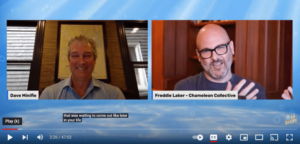Discover the difference between mission-driven and purpose-driven organizations and why leading with a purpose delivers better results.
Every company has a mission. Many of them have an entire page on their website dedicated to talking about their mission. But can the same be said about purpose? Not frequently enough.
On a recent episode of the Oh Ship! Show host Freddie Laker spoke with independent consultant Dave Minifie to discover what it means to be a mission-led or purpose-led company. In a nutshell, Minifie revealed that companies with a clear mission are generally good at what they do, but those that lead with a purpose are better at understanding why they exist. And most notably, companies that operate under the purpose-led framework tend to see greater success.
Meet Dave Minifie
Former marine Dave Minifie started his career at Procter & Gamble before moving on to become the Chief Experience Officer of the healthcare firm Centene. This role oversees the entire customer journey and is accountable for improving it while also communicating the company’s value proposition through its actions. One way that Minifie communicated this value proposition—and continues to instill in the companies he consults with—is by focusing on the company’s purpose rather than its mission.
Here’s Minifie’s take on what it means to be a purpose-led organization and why it matters.
Laker: What’s the difference between mission and purpose, and why does purpose matter?
The roles of a company’s mission and purpose are viewed differently based on the person viewing them. Having held the roles of both a Chief Experience Officer and a Chief Marketing Officer, Minifie understands the gap between the two better than many.
“Advertisers and marketers like to focus on transactions, then move into engagements. But the real holy grail for companies is relationships.” This comparison aligns perfectly with a company that’s mission-focused vs. one that’s led by purpose.
“In the Marine Corps, we talked a lot about missions. A mission was a very direct thing where we’d plan where we’d go, what to do on that hill, and so on. We were given orders, and with every order, we would also talk about the commander’s intent. Intent is the ‘why’ behind everything you do. For example, your mission might be to go to a certain spot and disrupt the communication of the enemy. But if the communication antenna has been moved, your job isn’t done, even though you went to that spot. You’ve got to figure out where to go and what to do next. So it’s not about completing a mission but rather fulfilling a purpose. The same can be applied in a business sense. The purpose is what’s guiding the mission, not the other way around.”
Minifie shares that too many organizations he’s worked with are mission-focused, using his role at a healthcare company as an example. Missions like improving health outcomes and lowering healthcare costs sound great! But Minifie points out that their competitors likely want those same things. Consumers want those things, too. Those missions, though admirable, had nothing to do with why the company existed. “We had to do some digging, but we decided that we existed to transform the health of the community in which we served. That became our purpose, and it was so much more inspirational than a mission to save money.”
Laker: Do all companies have (or need) a purpose? Do consumers know what a company’s purpose is?
Laker makes the suggestion that not all companies may have or need a purpose, and people will still buy from them. He points to Amazon as an example, noting that the company has surpassed so many competitors, and its profits and patronage continues to soar. While Minifie admits he hasn’t given much thought to Amazon or its potential purpose, he believes that the company still likely has one and benefits from it.
“If you’re wondering about Amazon’s purpose, look no further than its logo. Its smiling face arrow points from A to Z. From a founding standpoint, there was a great desire to make life easier in all ways for all things. The company has gone from books to full-blown retail and now web services and content streaming. With everything they do, that purpose of making life easier remains.”
However, Minifie admits that this isn’t true of all the powerhouses in Silicon Valley. Companies that are more profit-driven than purpose-driven often make themselves obvious. Whether or not that matters to customers when choosing who to do business with is a different story.
Laker: When does purpose matter most to an organization?
Laker sees how purpose can help a company maintain its resilience, especially in situations like the pandemic but also when business is going really well. Minifie echoes the idea, pointing to a book written by P&G’s former Chief Marketing Officer Jim Stengel called Grow.
“Stengel compared purpose-led and non-purpose-led companies and determined that over time, purpose does create a sustainable advantage. Purpose is the spine of the organization. It helps to keep everyone upright and straight and working as a body. Whether you’re going through a merger or acquisition, or you’re facing unprecedented uncertainty like many companies have been during the pandemic, purpose re-instills confidence.”
Minifie feels that purpose matters more in tough times and says it’s okay to be more mission-focused when things are going well. “Leaders can focus on margins and transactions and celebrate the fact that they’re delivering great business results. But when business gets tough, focusing on margin doesn’t feel as celebratory. At that point, the focus shifts to risk management. That can feel like doom and gloom, but when you’re purpose-driven, you understand why you exist as an organization and can rely on that purpose. It not only helps keep morale high internally but can also make it easier to deal with customers and reinforce your role to the people you serve.”
Subscribe to the Oh Ship! Show on YouTube and hear the full conversation with Dave Minifie.






